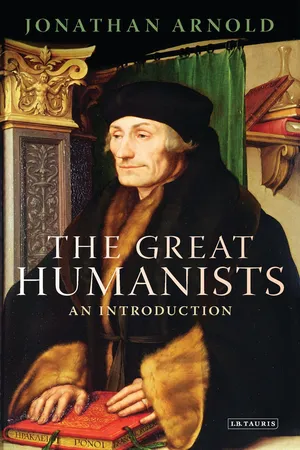![]()
NOTES
Introduction
1.J. Hankins, ‘Humanism, Scholasticism, and Renaissance Philosophy’ in J. Hankins (ed.), The Cambridge Companion to Renaissance Philosophy (Cambridge, 2007) [hereafter CCRP], pp. 30–48 [hereafter Hankins, ‘Humanism’]. Here at pp. 30–31, citing G. Voigt, Die Wiederbelebung des Classischen Altertums Oder das Erste Jahrhundert des Humanismus (Berlin, 1859) and V.R. Giustiani, ‘Homo, Humanus, and the Meanings of “Humanism” ’, The Journal of the History of Ideas [hereafter JHI], 46 (1985), pp. 167–95.
2.R. Weiss, The Dawn of Humanism in Italy (London, 1947), revised and reprinted in The Bulletin of the Institute of Historical Research, 42 (1969), pp. 1–16. [hereafter Weiss, ‘Dawn of Humanism’]. Here at p. 3. Other early humanists included Geri d’Arezzo and Francesco da Barberino in Florence, as well as Paolo da Perugia and Barbato da Sulmona in Naples.
3.R. Witt, ‘Coluccio Salutati in the Footsteps of the Ancients’, [hereafter Witt, ‘Salutati’] in A.A. MacDonald, Z.R.W.M. von Martels and J.R. Veenstra (eds.), Christian Humanism: Essays in Honour of Arjo Vanderjagt (Leiden, 2009) [hereafter Christian Humanism], pp. 3–12.
4.Attributed to the humanists Crotus Rubeanus (Johannes Jäger) and Ulrich von Hutten, who wrote a sequel (1519). L.W. Spitz, ‘The Renaissance: Humanism and Humanism Research’, English version of ‘Humanismus/Humanismusforschung’ in Theologische Realenzyklopädie, 15 (Berlin and New York, 1986), pp. 639–61; reprinted in L.W. Spitz, Luther and German Humanism, (Hampshire, 1996), pp. 1–40 [hereafter Spitz, ‘Humanism’]. Here at pp. 2–3.
5.For this survey, see M. Dowling, Fisher of Men: A Life of John Fisher, 1469–1535 (Basingstoke, 1999) [hereafter Dowling, Fisher], p. 31; N. Mann, ‘The Origins of Humanism’ in J. Kraye (ed.), The Cambridge Companion to Renaissance Humanism (Cambridge, 1996) [hereafter CCRH], p. 1; A. Hamilton, ‘Humanists and the Bible’ in CCRH, p. 100; N. Mann, ‘The Origins of Humanism’ in CCRH, pp. 1–2.
6.Hankins, ‘Humanism’, p. 31.
7.Ibid., p. 32.
8.Ibid.
9.D. MacCulloch, Reformation: Europe’s House Divided, 1470–1700 (London, 2003) [hereafter MacCulloch, Reformation], p. 76; R. Rex, ‘The New Learning’, The Journal of Ecclesiastical History [hereafter JEH], 44 (1993), pp. 26–44.
10.Hankins, ‘Humanism’, p. 46; P.O. Kristeller. ‘The Scholar and his Public in the Late Middle-Ages’ [hereafter Kristeller, ‘Scholar’] in E.P. Mahoney (ed.), Medieval Aspects of Renaissance Learning: Three Essays by Paul Oskar Kristeller (Durham, N. Carolina, 1974) [hereafter Kristeller, Renaissance Learning], pp. 3–28. Here at p. 10: For the humanists, ‘grammatical and historical interpretation for the most part takes the place of dialectical analysis and argumentation, more value is placed on style, and the terminology of scholastic learning is rather avoided.’; on the Septennium and liberal arts see S. IJsseling, Rhetoric and Philosophy in Conflict: A Historical Survey (The Hague, 1976) [hereafter IJsseling], p. 46.
11.P. Mack, ‘Montaigne and Christian Humanism’ in Christian Humanism, pp. 199–209. Here at p. 199.
12.IJsseling, p. 1. See also Spitz, ‘Humanism’, pp. 5–7; Weiss, ‘Dawn of Humanism’, p. 1.
13.Hankins, ‘Humanism’, p. 39; this point is also noted by R. Witt, ‘In the Footsteps of the Ancients’: The Origins of Humanism from Lovato to Bruni (Leiden, 2000), p. 240.
14.Witt, ‘Salutati’, p. 9.
15.Weiss, ‘Dawn of Humanism’, p. 14.
16.A. Levi, Renaissance and Reformation: The Intellectual Genesis (New Haven, Connecticut and London, 2002) [hereafter Levi], pp. 80–85.
17.F. Petrarch, ‘On his Own Ignorance and that of Many Others’, trans. H. Nachod in E. Cassirer, P.O. Kristeller and J.H. Randall, Jr. (eds.), The Renaissance Philosophy of Man (Chicago, 1948) [hereafter Renaissance Philosophy of Man], p. 115.
18.‘Nihil enim est aliud eloquentia nisi copiose loquens sapientia’: Cicero, De Partitione Oratoria, p. 79. Also quoted in H.H. Gray, ‘Renaissance Humanism: The Pursuit of Eloquence’, The Journal of the History of Ideas [hereafter JHI], 24 (1963), pp. 497–514, quoted on p. 508.
19.Kristeller, ‘Scholar’, p. 12.
20.Ibid., pp. 16–17.
21.Ibid., pp. 13–14.
22.J.B. Gleason, John Colet (Berkeley, 1989) [hereafter...




